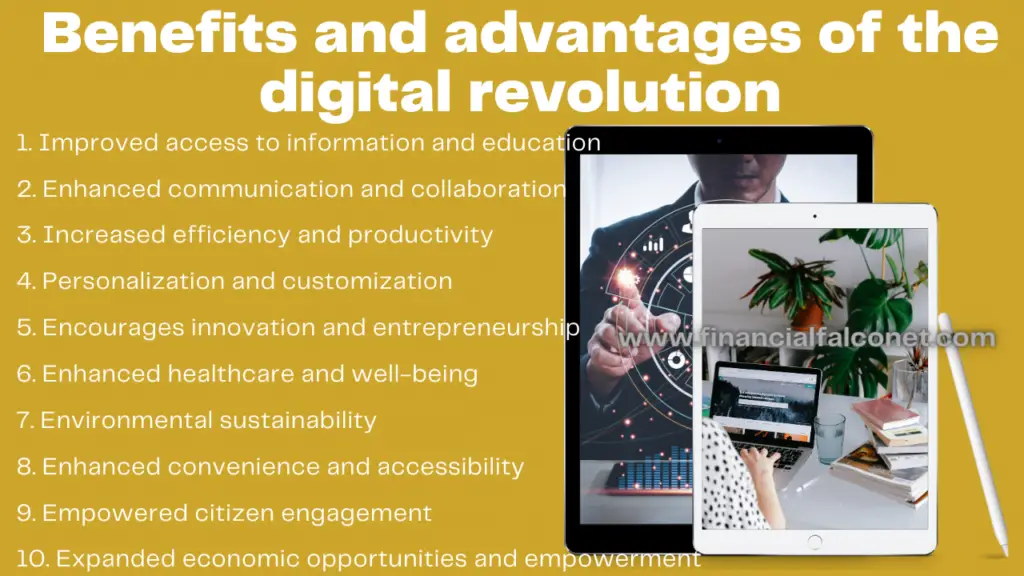The benefits and advantages of the digital revolution are numerous, they include increased connectivity, enhanced communication, improved access to information, and education amongst many other benefits which we shall discuss in this article. We shall also discuss the importance of the digital revolution in the world. Before we begin our discussion in earnest, let us understand what the digital revolution means.
Read about: Benefits of Socialism
What is the digital revolution?
The digital revolution refers to the rapid and widespread adoption of digital technology that has fundamentally transformed various aspects of society, including communication, commerce, education, entertainment, and more. It has resulted in significant changes in how people interact, work, and live, and has had a profound impact on the global economy, culture, and governance. The digital revolution is also referred to as the third industrial revolution.
The digital revolution has been driven by inventions and advancements in digital technologies, such as the Internet, smartphones, social media, cloud computing, big data analytics, artificial intelligence (AI), and the Internet of Things (IoT), among others. These technologies have revolutionized the way information is accessed, shared, and stored, and have transformed industries such as media, advertising, retail, finance, healthcare, and transportation.
The digital revolution has also brought about changes in societal norms and behaviors, such as the rise of social media as a primary mode of communication, the emergence of e-commerce as a dominant mode of shopping, the transformation of the job market with remote work and gig economy, and the increasing reliance on data-driven decision making in various domains.
Read about: Advantages of free market economy
Benefits and advantages of the digital revolution
- Increased connectivity
- Enhanced communication and collaboration
- Improved access to information and education
- Increased efficiency and productivity
- Personalization and customization
- Expanded economic opportunities and empowerment
- Encourages innovation and entrepreneurship
- Enhanced healthcare and well-being
- Environmental sustainability
- Enhanced convenience and accessibility
- Empowered citizen engagement
The digital revolution has brought about numerous benefits and advantages, transforming how people communicate, work, access information, and participate in economic, social, and cultural activities. It has created opportunities for innovation, efficiency, customization, and access to services and knowledge, leading to positive impacts on society, the economy, and individuals. Some of these benefits have been outlined above and will be discussed below:
Increased connectivity
Increased connectivity is one of the benefits of the digital revolution. The internet and digital technologies have connected people across the world like never before, creating a global network of communication and collaboration across geographical boundaries. This has facilitated the exchange of ideas, information, and knowledge, enabling people to connect, learn, and work together regardless of geographical barriers.
This increased connectivity has fostered interconnectedness and a sense of a global community through cultural exchange and promoted cross-cultural understanding. It has also facilitated global trade and commerce as well as knowledge sharing which is a wonderful advantage of the digital revolution.
Enhanced communication and collaboration
Another benefit of the digital revolution is enhanced communication and collaboration, digital technologies have revolutionized communication, making it faster, more efficient, convenient, accessible, and inclusive.
Email, instant messaging, video conferencing, social media, and other digital communication tools have allowed people to communicate instantly, regardless of location. This has improved communication in various settings, including businesses, governments, educational institutions, and personal relationships, enabling the quick and efficient exchange of information and ideas.
It has also improved collaboration among individuals, teams, and organizations thereby facilitating remote work, global business partnerships, and virtual collaborations.
Improved access to information and education
The digital revolution has democratized access to information, making knowledge more accessible to a wider audience.
The internet has become a vast repository of information, offering a wealth of educational resources, research materials, and news articles. This has empowered individuals to learn, educate themselves, and stay informed, resulting in increased knowledge dissemination and opportunities for lifelong learning.
Online education, e-learning platforms, and digital resources have also expanded access to quality education across the globe. These benefits of the digital revolution of improved access to information and education have further increased individual awareness on diverse matters and aided informed decision-making.
Increased efficiency and productivity
An additional benefit of the third industrial revolution is the availability of digital technologies which have transformed how work is done, leading to increased efficiency and productivity in many industries.
Automation, data analytics, and artificial intelligence have streamlined processes, reduced manual labor, made tasks more efficient, enabled data-driven decision-making, and optimized workflows.
This has resulted in improved operational efficiency, cost savings, increased productivity, and time savings in sectors such as manufacturing, logistics, healthcare, education, and customer service. It has also led to increased competitiveness, innovation, and economic growth. All these are advantages of the digital revolution.

Personalization and customization
One of the most noticeable advantages of the digital revolution is personalization and customization. The digital revolution has enabled personalized experiences and customization of products and services which has allowed for tailored experiences that cater to individual needs and preferences.
From personalized recommendations on e-commerce platforms to customized learning paths in online education to personalized savings plans. The personalization and customization of products and services have in turn made it easier for businesses to niche down the products or services they offer so as to adequately meet the demands of consumers who are in search of the specific product or services they offer.
These serve as an advantage to both businesses and consumers; the marketing efforts of businesses can be better channeled through identity-based marketing whereas consumers get to enjoy better services and products that meet their unique needs, requirements, and preferences.
Expanded economic opportunities and empowerment
A key benefit of the third industrial revolution is the creation of new economic opportunities through the transformation of traditional industries, and the empowerment of individuals. E-commerce has enabled businesses to reach global markets, creating opportunities for small and medium-sized enterprises (SMEs) to compete on a global scale.
Digital platforms have created new business models, such as the gig economy and the sharing economy, providing flexible income-generating opportunities for freelancers and gig workers.
Due to the digital revolution, new job opportunities have also emerged as digital industries such as e-commerce, digital marketing, online marketplaces, data security, cloud computing, and software development among many others have employed a considerable amount of people.
These increasing economic opportunities serve to empower individuals as they become better able to cater to their needs and even provide for other individuals who may be dependent on them.
Encourages innovation and entrepreneurship
One of the benefits of the digital revolution is that it encourages entrepreneurship, providing a platform for creativity and disruption as startups and innovators leverage digital technologies to create new business models.
Crowdfunding, crowdsourcing, and open innovation have enabled collaborative and decentralized approaches to problem-solving and innovation. This has resulted in new technologies, solutions, and industries, driving economic growth and societal progress. The third industrial revolution has also democratized creativity, allowing artists, writers, and creators to share their work with a global audience, thereby fostering artistic expression and cultural diversity.
Additionally, digital technologies have fostered innovation by enabling startups and individuals to develop and launch new products and services.
Unlike in the past when the development and launch of new products or services require millions of dollars to carry out, the digital age has made it relatively easier and cheaper to develop and launch new products and services. These are benefits of the digital revolution that have further resulted in the provision and availability of certain services such as banking and financial services to previously underserved populations.
This is because emerging entrepreneurs and businesses are mostly willing to take on more risks to break new ground as well as gain competitive advantages by serving communities where bigger names in the industries may not be willing to extend their products or services largely due to the lower purchasing power or low population.
As more communities get access to products and services, it further contributes to the overall economic growth of the region. All the above are benefits of the digital revolution to individuals, communities, and the world at large.

Enhanced healthcare and well-being
The third industrial revolution has transformed healthcare, leading to improved diagnosis, treatment, and patient care. This has been made possible through the availability of digital machines such as ultrasound, Magnetic resonance imaging (MRI) blood pressure monitors, weight trackers, etc.
Telemedicine has expanded access to healthcare services, especially in remote and underserved areas. Digital health records have improved patient data management and coordination of care as patient records have become more accessible to healthcare practitioners, especially in emergency situations. Wearable devices, health apps, and remote monitoring have further enabled personalized health tracking and wellness management, empowering individuals to take control of their health.
This combination of improved diagnosis, telemedicine, health apps, digital health records, and remote monitoring of health has led to the overall improvement of individual and societal well-being which is an important benefit of the digital revolution.
Environmental sustainability
One of the essential benefits of the digital revolution especially at this time in the world’s history where global warming is becoming a growing concern is its contribution to environmental sustainability.
Digital technologies have enabled remote work and virtual meetings, reducing the need for commuting and business travel, which can help reduce carbon emissions and alleviate traffic congestion thereby lowering the emission of greenhouse gases. Digital solutions, such as smart grids and sensors, can optimize resource usage, reduce waste, and promote energy efficiency.
Additionally, digital platforms have enabled the sharing economy and collaborative consumption, which can lead to more efficient use of resources and reduced consumption. All these are advantages of the digital revolution that benefit the environment as well as humans and animals alike.
Enhanced convenience and accessibility
An additional benefit of the digital revolution is enhanced convenience and accessibility. Digital technologies have made many aspects of life more convenient and accessible. For instance, online shopping has made it easier for consumers to purchase products and services from the comfort of their own homes. E-commerce has brought products and services to remote locations.
Digital payment systems have made transactions faster, easier, and more secure thereby eliminating the hassle that comes with cash transactions. Online services, such as telemedicine and e-learning, have expanded access to healthcare and education, particularly in remote or underserved areas. Telemedicine has enabled remote healthcare access, and online education has provided learning opportunities to those who may not have access to traditional education.
Digital accessibility has also made information and services more inclusive for people with disabilities, allowing them to participate more fully in society. These are all benefits of the digital revolution.
Empowered citizen engagement
Empowered citizen engagement is perhaps one of the biggest benefits of the digital revolution as it has empowered individuals to participate in civic and democratic processes. Social media, online petitions, and digital advocacy campaigns have given citizens a platform to voice their opinions, raise awareness, and advocate for social and political change.
Digital technologies have facilitated government transparency and accountability, enabling citizens to access information and engage with policymakers. This has resulted in increased civic engagement, citizen empowerment, and the potential for more participatory democracies which are all advantages of the digital revolution.
Read about: Positive effects of industrial revolution
What is the importance of digital revolution in the world?
The importance of the digital revolution in the world is numerous as the revolution has transformed the world in several ways. Some of the importance of the digital revolution in the world include connectivity, access to information, efficiency, and convenience of work, economic growth spurred by innovation, the transformation of industries, and informed decision-making guided by data.
The digital revolution has had a profound impact on the world, revolutionizing how people connect, access information, innovate, transact, and engage in social, economic, and cultural activities. Its importance lies in its transformative power, driving positive changes and shaping the future of societies, economies, and individuals. The additional importance of the digital revolution in the world includes:
- The digital revolution has connected people around the world like never before, breaking down geographic barriers and enabling instant communication and collaboration. This has facilitated global trade, knowledge sharing, and cultural exchange, leading to increased interconnectedness and fostering a sense of a global community.
- Democratized access to information makes knowledge and resources widely available. This has empowered individuals with access to education, news, and information, enabling them to make informed decisions, participate in civic activities, and engage in lifelong learning.
- The digital revolution has spurred innovation across industries, leading to the development of new technologies, products, and services. This has fueled economic growth and created new job opportunities, contributing to the advancement of societies and improving living standards.
- Digital technologies have streamlined processes and made transactions more efficient, convenient, and accessible. From online shopping and banking to e-governance and digital healthcare, the digital revolution has transformed how people interact with businesses, governments, and institutions, making everyday tasks more convenient and time-saving.
- The digital revolution has brought about significant social changes, including increased social awareness, activism, and advocacy. Social media has become a powerful tool for social change, facilitating movements and raising awareness on issues such as human rights, climate change, and social justice, amplifying voices that were previously marginalized.
- The third industrial revolution has generated vast amounts of data, which can be harnessed for insights and decision-making. Data analytics and artificial intelligence have transformed fields such as healthcare, finance, and marketing, enabling data-driven decision-making, personalized experiences, and improved outcomes.
- Traditional industries such as media, entertainment, and transportation have been disrupted by the digital revolution leading to the rise of new business models and transforming how industries operate. This has resulted in increased efficiency, cost savings, and improved consumer experiences.
Read about: Economic Effects of the Industrial Revolution
Conclusion
The third industrial revolution with its rapid advancements in digital technology has brought about numerous outcomes that have impacted various aspects of society.
Some benefits of the digital revolution include increased connectivity, convenience, efficiency, innovation, and economic growth. It has also facilitated access to information, education, and opportunities for many people around the world. Overall, the digital revolution has reshaped society in profound ways, and its effects continue to unfold as technology continues to evolve and influence various aspects of human life.
Last Updated on November 2, 2023 by Nansel Nanzip BongdapBlessing's experience lies in business, finance, literature, and marketing. She enjoys writing or editing in these fields, reflecting her experiences and expertise in all the content that she writes.
